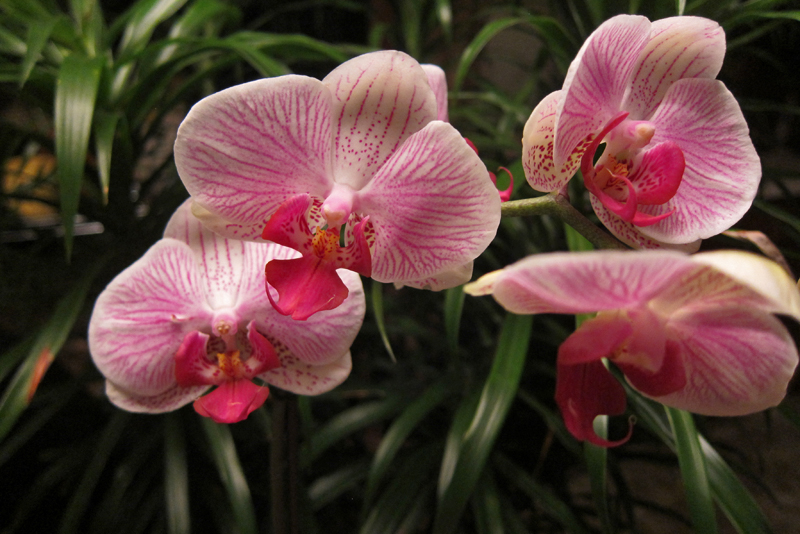Where, When And What Orchids To Buy

The best place to know more about orchids is an orchid show. For beginners, a visit to orchid shows is a must. Not only are different orchids on display but also a lot of information is available on orchids. Orchid experts at the shows can answer your queries and can explain the best ways to grow different orchids. Still if going to orchid shows is not possible, there are a few things you can chalk out before buying orchids.
Where to buy?:
• Buying for the first time? Place a small order to check the quality of the seller, though buying a single plant online can be expensive!
• When buying expensive orchids, reputed sellers are the best bet. Buying from your local orchid grower or the nursery can be helpful in the long run, as you can seek help/advice if the orchid is not responding well. But a word of caution, many orchid sellers do not actually grow these plants themselves and they might just have a cursory knowledge of the orchids. So, before buying an orchid just ensure that the orchid is tagged with its actual name. Otherwise, avoid buying because you will not know what conditions to provide.
• For online buying, check as many sites as possible. Read the reviews and if there are no reviews don’t buy. Check out what the seller has to offer, shipping and payment details, what is their customer satisfaction policy etc. Sometimes, sellers have unique offers, if the offer is too good to be true, do not buy.
When to buy?:
• Ii is best to buy as fresh an orchid as possible, i.e.buy the same day it arrives. This reduces the chances of bad handling and stress on the plant.
• If you are interested in buying an orchid in full bloom, be informed that many orchids die after blooming. Still, if you have fallen in love with an orchid in bloom then select an orchid with more buds than flowers.
• Some orchids, like the Phalaenopsis, are best bought when in bloom.
What orchids to buy?:
• First timers? Go for ‘easy to grow’ (hardy orchid) and commonly available orchids (like Cattleyas, Cymbidium, Dendrobiumsetc). Buy an orchid only when you can easily provide the conditions it requires. Once you get the hang of growing orchids and your orchids are flourishing, then you can explore other more delicate orchids requiring more specific conditions. To provide these specific needs you can utilize different apparatus available in the market.
• It is very important to buy an orchid with its name tagged. This will help in knowing the needs and requirements of that orchid.
• Select healthy plants. Do not buy an orchid which does not appeal to your eyes, there might be something wrong with it which you cannot put your finger on. Check for any signs of disease or pests, rot in roots, spots on leaves etc. Healthy orchids have firm and turgid parts. Leaves should be evenly green coloured. Darker or lighter shade of green in leaves is not a good sign. Check whether roots are firmly attached to the growth medium or not. This with help you to determine when the orchid was planted in that container.
• Give preference to your native orchid species. Buying exotic orchids puts the natural populations of that orchids at risk. Do your bit for conservation.
Where to buy?:
• Buying for the first time? Place a small order to check the quality of the seller, though buying a single plant online can be expensive!
• When buying expensive orchids, reputed sellers are the best bet. Buying from your local orchid grower or the nursery can be helpful in the long run, as you can seek help/advice if the orchid is not responding well. But a word of caution, many orchid sellers do not actually grow these plants themselves and they might just have a cursory knowledge of the orchids. So, before buying an orchid just ensure that the orchid is tagged with its actual name. Otherwise, avoid buying because you will not know what conditions to provide.
• For online buying, check as many sites as possible. Read the reviews and if there are no reviews don’t buy. Check out what the seller has to offer, shipping and payment details, what is their customer satisfaction policy etc. Sometimes, sellers have unique offers, if the offer is too good to be true, do not buy.
When to buy?:
• Ii is best to buy as fresh an orchid as possible, i.e.buy the same day it arrives. This reduces the chances of bad handling and stress on the plant.
• If you are interested in buying an orchid in full bloom, be informed that many orchids die after blooming. Still, if you have fallen in love with an orchid in bloom then select an orchid with more buds than flowers.
• Some orchids, like the Phalaenopsis, are best bought when in bloom.
What orchids to buy?:
• First timers? Go for ‘easy to grow’ (hardy orchid) and commonly available orchids (like Cattleyas, Cymbidium, Dendrobiumsetc). Buy an orchid only when you can easily provide the conditions it requires. Once you get the hang of growing orchids and your orchids are flourishing, then you can explore other more delicate orchids requiring more specific conditions. To provide these specific needs you can utilize different apparatus available in the market.
• It is very important to buy an orchid with its name tagged. This will help in knowing the needs and requirements of that orchid.
• Select healthy plants. Do not buy an orchid which does not appeal to your eyes, there might be something wrong with it which you cannot put your finger on. Check for any signs of disease or pests, rot in roots, spots on leaves etc. Healthy orchids have firm and turgid parts. Leaves should be evenly green coloured. Darker or lighter shade of green in leaves is not a good sign. Check whether roots are firmly attached to the growth medium or not. This with help you to determine when the orchid was planted in that container.
• Give preference to your native orchid species. Buying exotic orchids puts the natural populations of that orchids at risk. Do your bit for conservation.

Related Articles
Editor's Picks Articles
Top Ten Articles
Previous Features
Site Map
Content copyright © 2023 by Anu Dharmani. All rights reserved.
This content was written by Anu Dharmani. If you wish to use this content in any manner, you need written permission. Contact Anu Dharmani for details.





